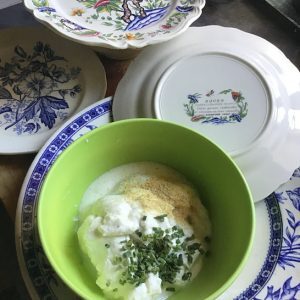Creating one cheese a day seemed like a reasonably sustainable practice when I started last January, but the method I developed implies that on any given day I have to give love and attention to at least five of them, before I can put them to rest to age and mature. That can grow to be a busy schedule, especially on days like today where I’m also making yogurt, sourdough, water kefir and several vinegars.
None of the jobs at hand are especially complicated or particularly annoying, but because fermentation involves a lot of variables that need checking it’s not something you can just do without thinking. For example, to keep track of all the different ferments I’m working with, I created a database where I can store additional information on what I’m doing, which ingredients I’m adding, including the source of those additions .
This way, looking back, I can make a better assessment what went wrong when things start to smell (Ivory still speaks in horror about the pungent scent of the over-fermented Kimchi I ate with pleasure the other day along with the stir-fry he had prepared. He forced me to get rid of it soon after. The database confirmed it was only 90 days old. To me it was fine. A bit sour, but fine).
I’ve been at this point in a food-preparation-journey (or any other life adventure for that matter) many times before: starting to experiment, dreaming about the inventions I’m going to make and then when I do succeed in a way I’m losing interest because the elements of surprise and marvel disappear. The been-there-done-that-disease slowly drizzles in, takes over and fills my brain with doubtful phrases: why would anyone want to make cheese when they have access to so many different cheeses of fantastic quality, because you actually come from one land of cheese (Holland, Oh, how I miss Gouda style cheeses!) and live in the other (France, no, mimolette doesn’t cut it for me) ? In fact, the cheeses we have easy access to are so fabulous that anything I come up with myself at best will be an addition, not a substitute.
Even though the COVID-19 global health crisis changed things around quite considerably, it also made us very aware of the fact that however self-sufficient we thought we were: we really aren’t. During confinement, which in France was one of the strictest in Europe, we were still allowed to go to the grocery store and there was an abundance of basically everything.
And although I used to go way more frequent (almost every day) than we do now (once a week or ten days), I still spend so much money on things we think we don’t need or are growing ourselves, but that are just not ready to harvest yet. Because of habits, I presume. Because we can afford to. Because you never know.
It sure is wonderful to have developed all kinds of skills that can help us through tougher times ahead, as an ongoing process. And there is that real sense of connection, with the soil, the old stones, the traditions and the ways of the past. Compared to our ‘old’ life, things have changed for the best for sure. At the same time I tell myself it’s more important than it ever was to keep motivate myself to do better. Consume less, live in the right now as much as I can, focus on my daily chores and the beauty they help me create.
I used to think the main reason for me to enjoy cooking food, creating new and experimental dishes using the flavors found in our direct environment, was to please others and to show off. But as of lately I realize more and more there’s really no one to please but me. And Ivory, of course.


